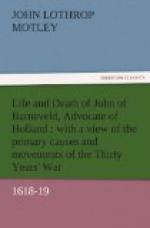They were not in search of material comfort and the chances of elevating their condition, by removing from an overpeopled country to an organized Commonwealth, offering a wide field for pauper labourers. Some of them were of good social rank and highest education, most of them in decent circumstances, none of them in absolute poverty. And a few years later they were to be joined by a far larger company with leaders and many brethren of ancient birth and landed possessions, men of “education, figure; and estate,” all ready to convert property into cash and to place it in joint-stock, not as the basis of promising speculation, but as the foundation of a church.
It signifies not how much or how little one may sympathize with their dogma or their discipline now. To the fact that the early settlement of that wilderness was by self-sacrificing men of earnestness and faith, who were bent on “advancing the Gospel of Christ in remote parts of the world,” in the midst of savage beasts, more savage men, and unimaginable difficulties and dangers, there can be little doubt that the highest forms of Western civilization are due. Through their provisional theocracy, the result of the independent church system was to establish the true purport of the Reformation, absolute religious equality. Civil and political equality followed as a matter of course.
Two centuries and a half have passed away.
There are now some seventy or eighty millions of the English-speaking race on both sides the Atlantic, almost equally divided between the United Kingdom and the United Republic, and the departure of those outcasts of James has interest and significance for them all.
Most fitly then, as a distinguished American statesman has remarked, does that scene on board the little English vessel, with the English pastor uttering his farewell blessing to a handful of English exiles for conscience sake; depicted on canvas by eminent artists, now adorn the halls of the American Congress and of the British Parliament. Sympathy with one of the many imperishable bonds of union between the two great and scarcely divided peoples.
We return to Barneveld in his solitary prison.
CHAPTER XX.
Barneveld’s Imprisonment—Ledenberg’s Examination and Death— Remonstrance of De Boississe—Aerssens admitted to the order of Knights—Trial of the Advocate—Barneveld’s Defence—The States proclaim a Public Fast—Du Maurier’s Speech before the Assembly— Barneveld’s Sentence—Barneveld prepares for Death—Goes to Execution.
The Advocate had been removed within a few days after the arrest from the chamber in Maurice’s apartments, where he had originally been confined, and was now in another building.




